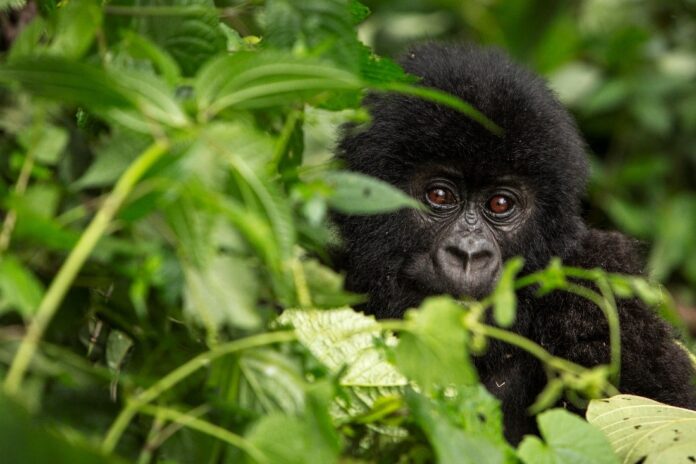
· Global wildlife populations see average decline of nearly 70% in just under 50 years
· Nature the ‘linchpin’ in our climate fight – without its protection and restoration, net zero goals will not be met
· Latin America and the Caribbean region, including the Amazon – critical in controlling global temperatures – have seen wildlife populations decimated and shrinking, on average, by 94% within a lifetime
· Failure of UK Government to keep climate and nature promises would be “greatest betrayal for all future generations” and could threaten UK’s economic recovery
· Welsh Government must take urgent action to deliver on nature and climate promises. This must include action on their commitment to deliver a seagrass restoration scheme across Wales.
· WWF projects in Wales are helping to tackle protect and restore nature and bring our world back to life
The speed and intensity with which we’re destroying the natural world is continuing at pace because World leaders are failing to deliver on their promises for nature and climate – putting unbearable strain on our planet and placing all life on earth on the brink of catastrophe, according to WWF.
The WWF’s flagship Living Planet Report, published today, shows that population sizes of global wildlife have plummeted by 69% on average since 1970. If we considered humankind as a single population, that would be the equivalent of us losing everyone from Europe, the Americas, Africa, Oceania and China.
This year’s report is the most comprehensive in its 24-year history and is based on data from ZSL’s Living Planet Index (LPI), which analyses almost 32,000 populations of 5,230 species – with more than 838 new species and just over 11,000 new populations added since the previous 2020 report. It emphasises that without halting and then reversing this catastrophic loss of the natural world, our climate fight will be lost. The report points to the consumption habits of wealthy countries and our reliance on fossil fuels as disproportionally driving nature loss.
WWF is particularly concerned about data from tropical regions including the Caribbean and Latin America – home to the Amazon and one of the most biodiverse regions on earth, which are seeing average wildlife population sizes plummet by 94% since 1970. This staggering rate outstrips all other regions on earth. Species seeing catastrophic loss include the Amazon pink river dolphin, which saw its population in the Mamirauá Sustainable Development Reserve, in the Brazilian state of Amazonas, plummet by 65% between 1994 and 2016.
WWF says that increased conservation and restoration action in these tropical regions are urgently needed but these efforts will not succeed unless world leaders, including Welsh Government act urgently to deliver their nature and climate promises. Action needs to be taken everywhere, not just in the tropics. According to the Biodiversity Intactness Index*, the UK has only 50% of its biodiversity richness compared to historic levels, placing us as one of the most nature-depleted countries in the world.
Welsh Government has recognised the vital need to invest in protecting and restoring nature through their commitment to protect and effectively manage 30% of land and sea for nature by 2030. WWF Cymru are calling on Welsh Government to follow up their ambition with urgent action to bring Welsh nature back from the brink of collapse.
Jessica McQuade, Head of Policy and Advocacy at WWF Cymru said:
“Across the world, and in the UK, nature is on its knees and world leaders are risking catastrophic consequences for people, planet and our economy by failing to act. We are hurtling towards a hotter planet where nature -and with it, our food, our homes and livelihoods – will be unable to survive without urgent action now to save our climate
“Last week, Welsh Government committed to ‘jump start the restoration of ecosystems in Wales. Whilst we welcome this, it only becomes impactful if the delivery happens at the scale and pace that it needs to.”
Nature is not only our biggest ally in the fight against climate change, but its power as a climate solution will have huge benefits for people and wildlife. Seagrass is one of these vital solutions. Although Welsh Government has promised to deliver a scheme to support seagrass restoration in Wales progress has been slow and now we urgently need to see this delivered. To build a better future for Wales and the World every promise must be kept.”
Seagrass is one of those powerful nature-based solutions that is in urgent need of restoration here in the UK, with up to 92% of this habitat lost in the last century. Globally seagrass has been found to be more effective at absorbing and storing carbon than tropical rainforests and thriving meadows enhance the biodiversity and health of our seas.
Welsh Government have recognised that protecting and restoring seagrass meadows in Wales is a priority and have committed to delivering a seagrass restoration scheme However, there is a lack of information on the progress of this scheme. WWF Cymru are calling on the Welsh Government to urgently announce their plans for the seagrass restoration scheme and reaffirm their commitment to deliver this vital restoration.
As well as pressing governments to deliver WWF are involved in pioneering projects in Wales to help restore and protect nature and avert dangerous climate change.
Seagrass Ocean Rescue – north Wales
Over the next four years 5 million seagrass seeds are to be planted together with communities in Pen Llŷn and Ynys Môn – the biggest restoration project in the UK. Seagrass Ocean Rescue, managed by WWF in partnership with Project Seagrass, Swansea University, North Wales Wildlife Trust and Pen Llŷn a’r Sarnau SAC, are working with communities to design and deliver this ambitious seagrass restoration project in north Wales. The project also aims to show the benefits that community-engaged conservation can bring and reconnect people with the sea and coast on their doorstep.
Seagrass has the potential to play a vital role in our response to the climate and nature crisis but the UK has lost up to 92 per cent of its seagrass in the last century. A single hectare of seagrass meadow can harbour up to 80,000 fish and 100 million. With the support of volunteers, the project aims to create 10 hectares of seagrass meadow by the end of 2026. Healthy meadows are critical for biodiversity, they provide nursery grounds for commercially important fish such as cod and plaice, and habitat for a range of species from octopus to seals.
Câr y Môr, regenerative ocean farm
Regenerative ocean farming is a growing industry in Europe, and the first community-owned farm in Wales, Câr y Môr, has recently been granted a licence to extend their existing farm to a three hectare site off Ramsey Sound – which could see the farm produce up to 50 tonnes of seaweed and shellfish annually. Regenerative ocean farming works in harmony with nature to grow seaweed and shellfish in the wild. It’s called regenerative because of the positive impact it has on the environment. The farms create habitat, nursery grounds and shelter for fish and other marine life. The seaweed absorbs carbon, nitrogen and phosphorus from the ocean making it easier for other species to thrive.
WWF is working with the farm based off the St David’s peninsula to monitor the impact the farm is having on the marine environment and biodiversity. At Câr y Môr seaweed is grown with oysters and rope grown mussels, to create a mixed farming system. Rope-grown mussels have one of the lowest environmental impacts of all seafood.
Other highlights from the study and the latest Living Planet Index data include:
Example species populations in decline (source: LPI database)
- Every year, we lose 10 million hectares of forests, or about the size of Portugal, and this destruction is detrimental to the climate, food security, and the livelihoods of millions globally
- On average, monitored populations of oceanic sharks and rays have decreased by 71% in the last 50 years
Example species populations bucking the global trend (source: LPI database)
- In the UK, the common crane became extinct around 1600 due to hunting and loss of habitat. However, a small breeding population was re-established in Norfolk in 1979 and a reintroduction programme launched in Somerset in 2010. 2021 was the most successful year for cranes since the 17th century. The total population is now thought to stand at more than 200.
- Despite years of civil unrest in the region where mountain gorillas live, conservation efforts have found success. In the Virunga Mountains along the northern border of Rwanda, the Democratic Republic of Congo and Uganda, populations of mountain gorillas have grown to 604 individuals, up from 480 individuals in 2010.
WWF stresses that these intensifying crises can be halted and reversed – but we need to see transformational change agreed by world leaders at the UN biodiversity summit this December. The summit represents the culmination of a multi-year process to negotiate the Global Biodiversity Framework and is a once-in-a-decade opportunity to forge a landmark agreement to halt and reverse nature loss by 2030.
However the whole process is in jeopardy with far from finalised agreements and insufficient progress. WWF warns if we fail to act to restore nature and safeguard the stability of the climate by 2030, the damage will become irreversible, leading to a domino effect in the shutdown of critical ecosystems around the world. WWF is calling on Welsh Government and UK Government, along with every world leader, to commit to five key promises in order to bring our world back to life:
- Deliver the net zero emissions target to avoid catastrophic climate change
- Protect and restore nature
- Stop funding harmful food production that destroys climate and nature
- Protect our environmental standards from bad deals
- Protect our forests and keep deforestation out of our supply chains
At a time when the UK is grappling with a cost of living and energy crisis, a rapid shift to net zero solutions such as cost-effective renewable energy and nature-friendly farming, would stimulate investment and get the economy back on track. Such interventions will enable the UK to compete better on world markets, create many new jobs, slash emissions, make space for nature and build the resilience of the UK’s food and energy systems for future generations.
WWF are calling on members of the public across the UK to use their voice to help bring our world back to life and hold our leaders to account. Visit Every promise for our world must be kept | WWF for more.
Help keep news FREE for our readers
Supporting your local community newspaper/online news outlet is crucial now more than ever. If you believe in independent journalism, then consider making a valuable contribution by making a one-time or monthly donation. We operate in rural areas where providing unbiased news can be challenging. Read More About Supporting The West Wales Chronicle

























